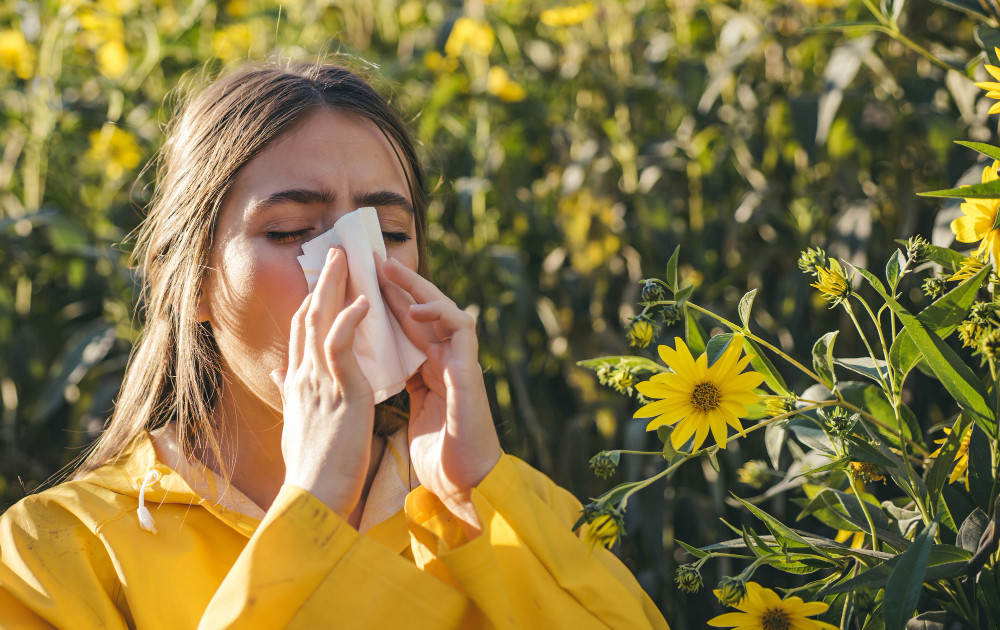
Do You Think You Are Allergic to Ragweed Pollen? Don’t Miss Reading This!
Are you allergic to the pollen released by ragweed plants? You are not alone. As per data from the American College of Allergy, Asthma & Immunology, roughly 23 million Americans suffer from the same.
Here’s a look at some interesting aspects about ragweed plants, the causes of ragweed allergies, symptoms, and treatment options available for patients.
Each Plant Can Produce 10 Million Pollen Grains Per Day!
Ragweed is a bushy plant, more like a soft-stemmed weed. The U.S is home to 17 species of ragweed. All of them have flowers that produce and release pollen.
The garden would be what you plant, but ragweed plants would come up on the side. So if there is one ragweed plant, you will see hundreds more in that area.
Are you planning to get rid of trees in the yard? Unfortunately, that won’t help because strong winds blow the pollen around hundreds of miles during the monsoon.
The fine-powder pollen is produced and released in the air between August and November. Levels peak during or after mid-September.
The substance is harmless, but the immune system starts fighting the same. Ragweed allergy symptoms include stomach ache, an itchy rash, redness in the eyes, stuffy nose, watery drainage through the nose, and sneezing attacks.
Why is Testing Crucial?
Ignoring the medical condition is not a good idea. In severe cases, ragweed allergies might result in headaches, chronic sinusitis, and worsened asthma symptoms.
Don’t self-diagnose. It does not make sense to get over-the-counter medications for dust mites if you are not allergic to them. And this is where allergic testing enters the picture. Testing can help determine precisely what you are allergic to.
A skin prick or scratch test, intradermal test, patch test, or blood test can help determine particles triggering an allergy.
Are you always bothered by chronic stuffiness and cannot breathe through your nose? If so, don’t solely rely on nasal decongestant sprays. It is always better to get evaluated. Who knows? It could be polyps, badly deviated septum, or other more correctable issues.
Have you heard about perennial allergies? Do you experience allergies all year round? The reason can be dust mites, pet dander, or molds. Therefore, if your symptoms aren’t manageable with simple medications, it’s a good idea to get evaluated by a general allergist.
Treatment Options
A board-certified allergist can help you with the right allergy shots. You can also get environmental controls to help deal with specific allergies.
Certified allergists prescribe nasal steroids, allergy eye drops, decongestant combinations (oral decongestants), and other steroids to help decongestion as and when required.
Are Allergy Shots Safe? How Do They Work?
Allergy shots consist of allergen doses that create tolerance for the seeder.
Patients get weekly shots during the initial stage. The second phase involves monthly shots.
Yes, it is a long-term commitment. The treatment lasts for three to five years in most cases.
There are drops (oral) and tablets for individuals who dislike shots. You can schedule an appointment at a reputed clinic, like Frontier Allergy, Asthma, and Immunology, and discuss treatment options with an allergist in Austin, Tx.
Tried and Tested Preventative Measures
Patients are advised to take precautions from the timeframe between late summer to early fall. The period is also referred to as ragweed season.
- Wear a surgical face mask while outside
- Avoid going out between 5 and 10 AM as the pollen counts are highest
- You should not exercise when the pollen content is high in the air
- You can reduce the exposure to pollens by simply keeping car windows closed while traveling
- Remove your shoes at the door to ensure you do not spread pollen inside the house
- Take a shower after returning home
- To get rid of allergens from pollen, wash your clothes in hot water
- Give a bath to your pets if they play outside
- Ensure your house’s air conditioning and air filter systems do not need a filter change

Written/Reviewed by: Dr. Neha Reshamwala
NPI number: 1780874578
Page last reviewed: 03/12/2024


 All blog posts
All blog posts





